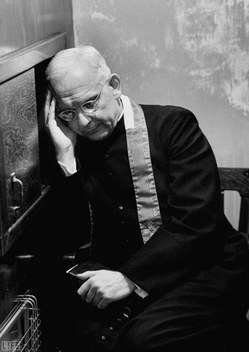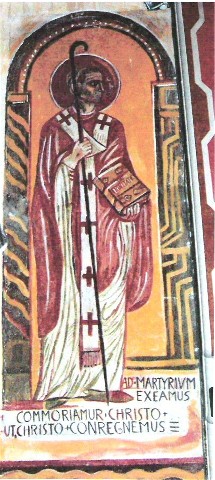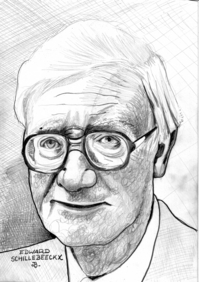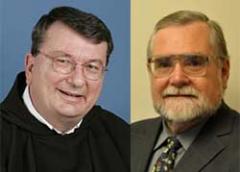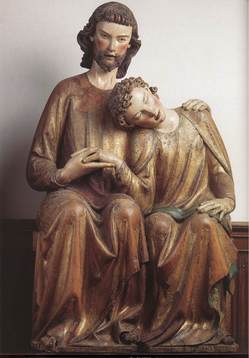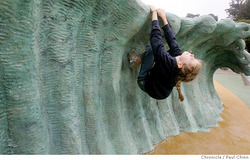Benedict XVI
addressed participants in a short course on the internal forum on March 11 hosted and organized by Archbishop Fortunato Baldelli and Bishop Gianfranco Girotti, OFM Conv., of the Apostolic Penitentiary. Next
to the celebration of the Mass, there is likely no other important work of a
priest than to reconcile sinners to God. This is a helpful teaching of the Pope’s since at the seminary dinner table these days there’s much conversation about the priest’s ministry of forgiveness. Note what I think are the important
points the Holy Father makes regarding the dialogue of salvation.
Your course is placed, providentially, in the Year for Priests, which I
proclaimed for the 150th anniversary of the birth in heaven of St. John Mary
Vianney, who exercised in a heroic and fruitful way the ministry of
reconciliation. As stated in the letter of proclamation: “All of us
priests must hear those words which regard us personally that he (the Curé
d’Ars) put in Christ’s mouth: ‘I will charge my ministers with proclaiming to
sinners, whom I am always ready to receive, that my Mercy is infinite.’ From
the Holy Curé d’Ars we priests can learn not only an inexhaustible trust in the
sacrament of penance, which drives us to put it at the center of our pastoral
concerns, but also the method of the ‘dialogue of salvation’ that should be
carried out in it.”
Where do the roots of heroism and fruitfulness sink,
with which St. John Mary Vianney lived his own ministry of confessor? First of
all in an intense personal penitential dimension. The awareness of one’s own
limits and the need to take recourse to Divine Mercy to ask for pardon, to
convert the heart and to be sustained on the path of sanctity, are essential in
the life of the priest: Only one who has first experienced its greatness can be
a convinced herald and administrator of the Mercy of God. Every priest becomes
minister of penance by his ontological configuration to Christ, High and
Eternal Priest, who reconciles humanity with the Father; however, fidelity in
administering the sacrament of reconciliation is entrusted to the responsibility
of the presbyter.
We live in a cultural context marked by a hedonistic and
relativistic mentality, which tends to cancel God from the horizon of life,
does not favor the acquisition of a clear picture of values of reference and
does not help to discern good from the evil and to mature a correct sense of
sin. This situation makes even more urgent the service of administrators of
Divine Mercy.
We must not forget, in fact, that there is a sort of vicious
circle between obfuscation of the experience of God and the loss of the sense
of sin. However, if we look at the cultural context in which St. John Mary
Vianney lived, we see that, in several aspects, it was not so dissimilar from
ours. Also in his time, in fact, a hostile mentality to faith existed,
expressed by forces that sought actually to impede the exercise of the
ministry. In such circumstances, the Holy Curé d’Ars made “the church his
home,” to lead men to God. He lived radically the spirit of prayer, the
personal and intimate relationship with Christ, the celebration of Mass,
Eucharistic adoration and evangelical poverty, appearing to his contemporaries
as such an evident sign of the presence of God, as to drive so many penitents
to approach his confessional.
In the conditions of liberty in which it is
possible to exercise today the priestly ministry, it is necessary that the
presbyters live in a “lofty way” their own response to their
vocation, because only one who becomes every day the living and clear presence
of the Lord can arouse in the faithful the sense of sin, give courage and have
the desire born for the forgiveness of God.
Dear brothers, it is necessary to
turn to the confessional, as place in which to celebrate the sacrament of
reconciliation, but also as place in which to “dwell” more often, so
that the faithful can find mercy, counsel and comfort, feel loved and
understood by God and experience the presence of Divine Mercy, close to the real
Presence in the Eucharist.
The “crisis” of the Sacrament of Penance,
so often talked about, is a question that faces first of all priests and their
great responsibility to educate the People of God to the radical demands of the
Gospel. In particular, it asks them to dedicate themselves generously to the
listening of sacramental confessions; to guide the flock with courage, so that
it will not be conformed to the mentality of this world (cf. Romans 12:2), but
will be able to make choices also against the current, avoiding accommodations
and compromises. Because of this it is important that the priest have a
permanent ascetic tension, nourished by communion with God, and that he
dedicate himself to a constant updating in the study of moral theology and of
human sciences.
St. John Mary
Vianney was able to establish with penitents a real and proper “dialogue
of salvation,” showing the beauty and greatness of the Lord’s goodness and
arousing that desire for God and heaven, of which the saints are the first
bearers. He affirmed: “The good God knows everything. Before you even
confess, he knows that you will sin again and yet he forgives you. How great is
the love of our God, which drives him to willingly forget the future, so as to
forgive us” (Monnin A., Il Curato d’Ars. Vita di Gian-Battista-Maria
Vianney, Vol. 1, Turin, 1870, p. 130).
It is the priest’s task to foster
that experience of “dialogue of salvation,” which, born of the
certainty of being loved by God, helps man to acknowledge his own sin and to
introduce himself, progressively, into that stable dynamic of conversion of
heart, which leads to the radical renunciation of evil and to a life according
to God (cf. Catechism of the Catholic Church, No. 1431).
Dear priests, what an
extraordinary ministry the Lord has entrusted to us! As in the Eucharistic
Celebration he puts himself in the hands of the priest to continue to be
present in the midst of his people, similarly, in the sacrament of
reconciliation he entrusts himself to the priest so that men will have the
experience of the embrace with which the Father receives the prodigal son,
restoring him the filial dignity and reconstituting him fully heir (cf. Luke
15:11-32).
